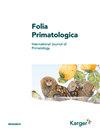狐猴种子传播在恢复马达加斯加退化森林生态系统中的作用
IF 0.8
4区 生物学
Q2 ZOOLOGY
引用次数: 2
摘要
人为干扰导致热带森林的退化或破坏,对动植物和当地人民产生负面影响。恢复种植可以弥补这些影响,但时间和财政支出很高。因此,优先考虑的往往是一些没有什么保护价值的引进物种的人工林。动物种子的传播可以使恢复植物多样化并加速其再生,从而降低其成本。研究了冠狐猴(Eulemur coronatus)种子在马达加斯加北部高度退化森林中的传播数量和质量,进行了行为观察和萌发实验,并描述了传播植物物种的特征。冠狐猴以果为食,能传播大量的种子和植物。虽然肠道通过对发芽有负面影响,但去除果肉的积极影响超过了这些影响,导致对再生的总体积极影响。我们的研究证实,肠道通道的影响依赖于分散的植物种类。我们发现了20种植物,其中包括3种濒临灭绝的植物,它们在欧龙加的唯一传播者似乎是冠狐猴。结果表明,狐猴通过种子传播在保护植物物种和维持健康生态系统中发挥着重要作用,冠状狐猴是其中的关键物种。此外,如果将狐猴纳入恢复,它们将分散传统恢复种植无法匹配的植物物种多样性。它们的影响将促进一些植物物种的再生,但不是所有的植物物种。负面影响,如通过狐猴种子传播入侵物种的传播,也必须加以考虑。本文章由计算机程序翻译,如有差异,请以英文原文为准。
The role of lemur seed dispersal in restoring degraded forest ecosystems in Madagascar
Anthropogenic disturbances lead to the degradation or destruction of tropical forests, with negative consequences for flora, fauna, and local people. Restoration plantings may compensate these impacts, but time and financial expenditures are high. Thus, priority is often given to plantations of a few introduced species that have little value for conservation. Animal seed dispersal may diversify and accelerate regeneration of restoration plantings, thereby lowering their costs. We studied seed dispersal quantity and quality of crowned lemurs (Eulemur coronatus) in a highly degraded forest in northern Madagascar, conducting behavioural observations and germination experiments and describing dispersed plant species’ characteristics. Crowned lemurs were highly frugivorous, dispersing a large number of seeds and plant species. While there were negative effects of gut passage on germination, the positive effects of pulp removal outweighed these, resulting in an overall positive effect on regeneration. Our study confirmed that effects of gut passage are dependent on the dispersed plant species. We found 20 plant species, including three threatened with extinction, whose only dispersers in Oronjia seem to be crowned lemurs. We conclude that lemurs play important roles in protecting plant species and maintaining healthy ecosystems through seed dispersal, and that E. coronatus is a key species in this respect. In addition, if lemurs were included in restoration, they would disperse a diversity of plant species that cannot be matched by conventional restoration plantings. Their influence would facilitate the regeneration of some, but not all plant species. Negative effects, like the spread of invasive species through seed dispersal by lemurs, must also be considered.
求助全文
通过发布文献求助,成功后即可免费获取论文全文。
去求助
来源期刊

Folia Primatologica
生物-动物学
CiteScore
3.30
自引率
10.50%
发文量
36
审稿时长
>12 weeks
期刊介绍:
Recognizing that research in human biology must be founded on a comparative knowledge of our closest relatives, this journal is the natural scientist''s ideal means of access to the best of current primate research. ''Folia Primatologica'' covers fields as diverse as molecular biology and social behaviour, and features articles on ecology, conservation, palaeontology, systematics and functional anatomy. In-depth articles and invited reviews are contributed by the world’s leading primatologists. In addition, special issues provide rapid peer-reviewed publication of conference proceedings. ''Folia Primatologica'' is one of the top-rated primatology publications and is acknowledged worldwide as a high-impact core journal for primatologists, zoologists and anthropologists.
 求助内容:
求助内容: 应助结果提醒方式:
应助结果提醒方式:


